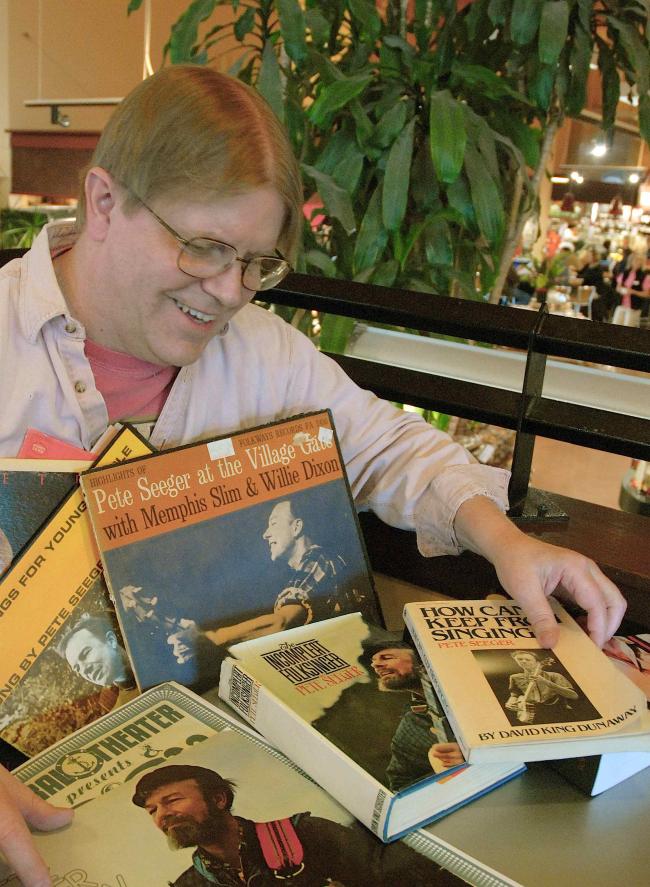Pete Seeger's life to be celebrated at Admiral Theater
West Seattle author and folk music devotee Clay Eals sorts through his prized collection of albums, books, and posters of folk artist icon Pete Seeger. Eals will host a tribute to Seeger at the Admiral Theater Sunday, May 3.
Thu, 04/23/2009
The Admiral Theater is hosting a hootenanny Sunday, May 3, and it should be a humdinger. That’s because the bands and sing-alongs will honor legendary folksinger, songwriter and humanitarian Pete Seeger who turns 90 the same day.
A portion of the proceeds will go to the Northwest Folklife Festival. The show is called “For Pete’s Sake: Sing!” and is divided into two sections.
First, the 90-minute PBS documentary “Pete Seeger: The Power of Song” will be shown at 4 p.m. The theater will then be cleared. At 7 p.m., a live program featuring bands and sing-alongs will run until about 10 p.m. Video clips of Pete Seeger’s appearance at Seattle’s 1997 Northwest Folklife will be spliced into the live performances.
Longtime Seattle folksinger Tom Colwell and his nine-piece Southbound Odyssey band will be the featured musical act. Other performers include the Clallam County Band and eight members of the Seattle Labor Chorus that formed at the 1997 Folklife Festival where they played with Seeger.
Numerous Seeger-themed concerts will occur worldwide the same day. The biggie will be the Clearwater Concert at Madison Square Garden where Bruce Springsteen, Eddie Vedder, Arlo Guthrie, Joan Baez, Steve Earle and others will join Seeger on stage. Seeger and Springsteen performed Woody Guthrie’s classic, “This Land is Your Land” together at President Obama’s inauguration.
“Our society has a notoriously short attention span that is getting shorter,” said folk music maven Clay Eals, who organized and will host the Admiral Theater event. “I think there’s a yearning for music that is both melodic and substantive," he said, referring to the folk music genre.
Eals, a former West Seattle Herald Editor, wrote the 800-paged softcover book, “Steve Goodman: Facing the Music.” Eals interviewed Seeger twice, in 1999, and 2000, for his book. He filmed Seeger at the 1997 Folklife Festival and highlights will be shown at the event.
Goodman was a Chicago folk artist best known for his 1970 song, “City of New Orleans,” which became an Arlo Guthrie hit two years later. Arlo’s father, Woody, and Pete Seeger were contemporaries and played together in the band The Almanacs, beginning in 1940. Seeger then became one of the four Weavers.
He wrote, or co-wrote, “If I Had a Hammer,” “Where Have All the Flowers Gone,” and “Turn! Turn! Turn!" popularized respectively by Peter, Paul & Mary, the Kingston Trio, and the Byrds. But for more than 10 years Seeger’s hammer was yanked from his hand.
“That was the time of McCarthyism and the blacklist,” Eals pointed out. “Some considered ‘If I Had a Hammer’ a communist song and believed it referred to the ‘hammer and sickle,’ but it was actually a metaphoric song to spur people to do good for society. It’s all too easy to be simplistic about the ‘communist scare,’ which appealed to base fears, making things black and white, a witch-hunt. The situation then was more complex than black and white, with many organizations all over the spectrum, left to right, and Seeger was at the left end of the spectrum.
“The Weavers were hit-makers with 'Goodnight Irene' and others, but Seeger was reduced to singing summer camps and children’s concerts for more than a decade,” Eals continued. “He couldn’t get work. As late as 1967 when Pete wrote the Vietnam protest song 'Waist Deep in the Big Muddy,' and performed it on the Smother Brothers (Comedy Hour,) CBS management cut out the song. Either you laughed or you cried because you saw the song being introduced, then just the audience’s applause. It was obviously edited with the song sliced out of the tape."
The Smothers Brothers protested and Seeger returned four months later to perform it on the air.
Waist deep in the folk music, Colwell said he picked up a guitar in 1957 and has played in Seattle since 1968. Colwell's voice is evocative of Seeger's. “Early on I performed at a club called The Dark Side of the Green Spider in Denver, where Judy Collins made her name,” he said.
Colwell also performed at Dirty Dans in Chicago and invited Steve Goodman up on stage, He loaned Goodman his six-string guitar. They opened with “City of New Orleans."
“We played together for 40 minutes,” Colwell proudly recalled.
At the Admiral show, if you prefer to listen to folk music rather than hoot your own horn, no worries, according to Colwell.
“Singing along is not required,” Colwell said. “Many in the audience will know the words to a lot of the songs, and it’s my job to make them comfortable to sing them.”


